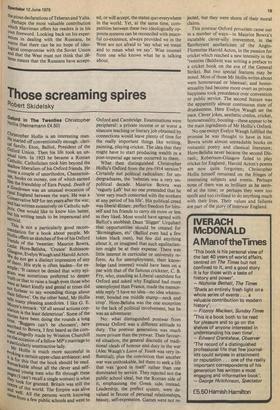Those screaming spires
Robert Siudelsky
OXford in The Twenties Christopher 1-10I115 (Heinemann £4.50) Christopher Hollis is an interesting man. He started off conventionally enough; clerical family, Eton, Balliol, President of the Oxford Union. Then his life took an unnsual turn. In 1923 he became a Roman Catholic. Catholicism took him beyond the Shallow liberalism of his Oxford friends. He Wrote a couple of unorthodox, Chestertontan, books on money, one of which earned him the friendship of Ezra Pound. Death of a Gendentan was an unusual evocation of 1:..,aral England between the wars. He was a Conservative MP for ten years after the war, a.nd has written extensively on Catholic subjects. One would like to know him better, nt his writing tends to be impersonal and unvivid.
This is not a particularly good recommendation for a book about people. Mr i P011is offers us sketches of five of his Oxford riends of the 'twenties: Maurice Bowra, Leslie Hore-Belisha, 'Crusoe' RobinsonA;asgow, Evelyn Waugh and Harold Acton. do not get a distinct impression of any of LthemHis style is often leaden—for ex.—'1131e: 'It cannot be denied that witty epigrt,am was sometimes preferred to deeper nth or that to raise a laugh even those who rere at heart kindly and genial at times did .t;°t forbear to say wounding things about ttheir fellows'. On the other hand, Mr Hollis NTS many pleasing anecdotes. I like G. E. ,°?re's remark : 'Of all sexual actions coputation is the least deleterious'. Some of the ories have been doing the rounds a long arile.. 'Buggers can't be choosers', here ns)eribed to Bowra, I first heard as the comment allegedly made by Winston Churchill an the occasion of a fellow MP's marriage to
Mr unattractive lady.
ev wit; Hollis is much more successful in it ?king a certain upper-class ambience; and la for this that the book should be read. :ernarkable about all the clever and self"p4asUred Young men who flit through these thr (I can't recall a single woman) is what ce y took for granted. Britain was still the arincitre of the world. The Empire was alive ea, well. All the persons worth knowing from a few public schools and went to
Oxford and Cambridge. Examinations were peripheral : a private income or at worst a sinecure teaching or literary job obtained by connections would leave plenty of time for the really important things like writing, painting, playing cricket. The idea that they might have to start producing wealth in a post-imperial age never occurred to them. What then distinguished Christopher Hollis's Oxford from the pre-1914 version ? Certainly not political radicalism : for undergraduates, the 'twenties was a very unpolitical decade. Maurice Bowra was 'vaguely Left' but no one pretended that he 'ever very much consorted with the workers at any period of his life'. His political creed was liberal elitism : perfect freedom for himself and his friends to carry on more or less as they liked. Most would have agreed with Balliol's snobbish Dean `Sligger Urquhart that opportunities should be created for 'Birmingham, etc' (Balliol even had a few token black men), but few did anything about it, or imagined that such egalitarianism might be at their expense. There was little interest in curricular or university reform. As for unemployment, their knowledge (and interest) would have been on a par with that of the famous cricketer, C. B. Fry, who, standing as Liberal candidate for Oxford and asked why England had more unemployed than France, made the memorable reply 'I have no idea—no idea whatsoever, bowled me middle stump—neck and crop'. Hore-Belisha was the one exception to the lack of political involvement, but he was an adventurer.
No: what distinguished postwar from prewar Oxford was a different attitude to duty. The postwar generation was much more private than the prewar. Their favoured situation, the general discredit of tradi
tional ideals of honour and duty in the war (Alec Waugh's Loom of Youth was very in
fluential), plus the conviction that another war was unthinkable, led them to seek a life that was 'good in itself' rather than one dominated by service. They rejected not tha public school ideal, but the Roman side of it, emphasising the Greek side instead.
Leadership, the prefect system, were devalued in favour of personal relationships, beauty, self-expression. Games were not re jected, but they were shorn of their moral claims.
This postwar Oxford privatism came out in a number of ways—in Maurice Bowra's incurable clever-silly irreverence, in the flamboyant aestheticism of the AngloFlorentine Harold Acton, in the passion for cricket which reached a new intensity in the 'twenties (Baldwin was writing a preface to a cricket book on the eve of the General Strike). But two special features may be noted. Most of those Mr Hollis writes about were homosexual or bisexual; and homosexuality had become more overt as private happiness took precedence over convention or public service. The second feature was the apparently almost continuous state of drunkenness. Here Evelyn Waugh set the pace. Clever jokes, aesthetic credos, cricket, homosexuality, boozing—these appear to be the main ingredients of Mr Hollis's Oxford.
No one except Evelyn Waugh fulfilled the promise he was thought to have in him. Bowra wrote almost unreadable books on romantic poetry and classical literature; Hore-Belisha never became the second Disraeli; Robertson-Glasgow failed to play cricket for England; Harold Acton's poems are now quite forgotten; Christopher Hollis himself remained on the fringes of interesting subjects and events. Perhaps none of them was as brilliant as he seemed at the time; or perhaps they were too spoilt and too civilised to do anything much with their lives. Their values and failures are part of the story of interwar England.


































 Previous page
Previous page